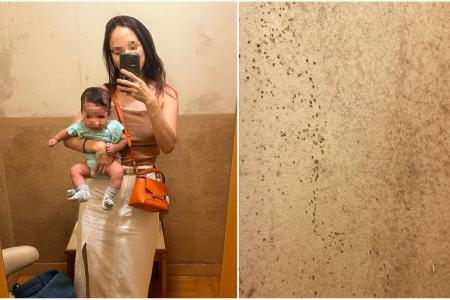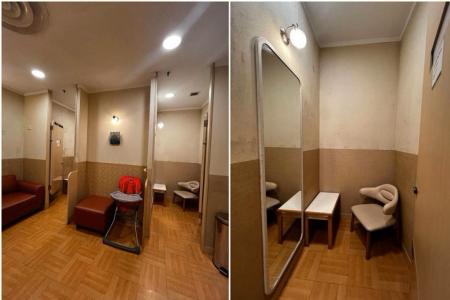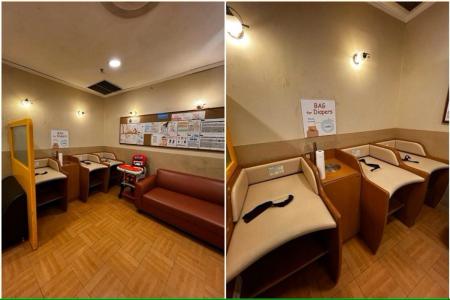Mum horrified by mould on walls and baby chairs in Isetan Scotts nursing room
When stay-at-home mum Clara Tan walked into a quiet and spacious fourth-floor nursing room in Isetan Scotts, she thought it was the perfect place to feed her three-month-old daughter until she noticed the mould on the wall.
She realised mould on the wall was not the only problem when she stopped to take a photograph of her baby and herself, and faced the mirror.
In a post on social media platform TikTok on Aug 23, the 29-year-old said: “To my horror, I noticed that the walls were heavily covered in mould. And it wasn’t just the walls – even the chairs and baby chairs were affected.”
Concerned for other nursing mothers and babies who might use the room, Ms Tan put up the photos on TikTok.
The photos show many seating areas in the room, as well as two nursing cubicles, diaper changing tables, baby chairs and a washing area. Black spots can be seen covering large parts of the wall.
The photos drew comments from numerous TikTok users.
One, with the handle oofibrawl, said: “Nursing/changing areas need more attention from shopping mall managements, otherwise don’t have them at all.”
Speaking to The Straits Times, Ms Tan said she was in the room for about three minutes but did not sit down. She did, however, put her baby carrier on a chair that had mould. She had it sanitised as soon as she could.
She added that she was worried about the health of others who might use the room, and had contacted Isetan to air her concerns.
In the meantime, Ms Tan urged young mothers to avoid using the Isetan nursing room.
In response to queries, Isetan Singapore said it has taken immediate action to address the issue.
“The room has been closed for a comprehensive refurbishment, including thorough cleaning, sanitisation, repainting and replacing furnishings. To ensure the highest standards, the room will undergo another round of sanitisation after repainting before it is reopened,” said a spokesman.
Isetan Singapore is investigating the cause of the mould, with preliminary findings suggesting it may have resulted from moisture caused by the air-conditioning system. The spokesman said there were already plans to refurbish the room.
“We regret that it was not closed off sooner. We are now reaching out to those who provided feedback, including the individual who posted the TikTok video,” said the spokesman.
Dr Loh Jia Tong, 35, an assistant professor from Nanyang Technological University’s School of Biological Sciences, said: “Exposure to mould in early life is associated with higher risk of developing atopic diseases like asthma and rhinitis.
“This is because mould can release allergens, and the immune system of predisposed individuals will overreact to it. However, the effects of mould on breastfeeding is not well-studied to date.”
The Journal of the American Medical Association says atopic diseases are linked by an underlying problem with the immune system.
Mould removal companies ST spoke to said the mould could have developed to the extent seen in Ms Tan’s photos over the span of three weeks to three months.
Testing is needed to accurately identify what species of mould it could be, but mould removal firm EcoSense director Thomas Lou said it could be what is commonly known as “black mould”.
In Singapore, black mould is commonly found on walls, and produces toxins that can cause respiratory or skin issues.
In Ms Tan’s photos of the nursing room, the mould can be seen covering most of the walls and ceiling, added Mr Lou.
He said: “Mould is built up in this space because there is no natural or direct sunlight entering the room.” One way to prevent mould growth is exposure to ultraviolet rays from sunlight, he added.
The nursing room in Isetan Scotts, Mr Lou said, does not appear to have any windows, which means moisture on walls or surfaces cannot evaporate due to lack of airflow.
Closing off the nursing room and getting it treated is advised, he added, with preventive measures put in place before it reopens.
Mold Medic owner James Chua, said those who are at higher risk of mould-related health issues include vulnerable groups such as children, seniors or people with asthma or compromised immune systems.
Exposure to mould can cause an increase in asthma symptoms or trigger asthma attacks in asthma-prone people, he added. Spores can also irritate the eyes, nose, and respiratory tract leading to infections, said Mr Chua.
A spokesperson from Mouldgone, a subsidiary of pest control and hygiene firm Rentokil Initial Singapore, said businesses suffering from mould issues need to get rid of conditions that foster the growth of such organisms – advice that other mould removal firms also offered.
One way is to lower humidity levels with dehumidifiers, ensure adequate air circulation, set the air-conditioning temperature to avoid condensation on surfaces, and apply high-quality anti-mould paint.
Get The New Paper on your phone with the free TNP app. Download from the Apple App Store or Google Play Store now



